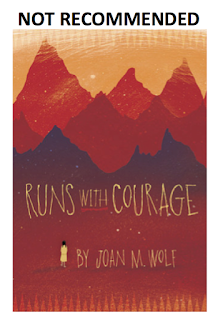January 7, 2017
Dear Teachers,
I know that some of you assign Joseph Boyden's Three Day Road to students in your high school classes. Some of you may be doing author studies of him. This letter and information I share beneath the letter, in two parts, is for you, and for anyone who is interested in discussions of Boyden's identity. It is an archive of items about Joseph Boyden's identity.
I'm a former school teacher, too. I particularly enjoyed reading aloud to the kindergarten and first graders I taught in the 90s, and teaching kids about the authors and other books they wrote. I'm not teaching anymore. Now, I research and write articles and book chapters about the ways Native peoples are depicted in children's and young adult books. And, I publish this site, American Indians in Children's Literature, which is now in its eleventh year.
In 2014, I learned about a writer named Joseph Boyden. A novel he'd written, The Orenda, was in Canada Reads, which is an annual battle-of-the-books competition. The Orenda was being defended by Wab Kinew. I'd become familiar with Kinew's work via social media. Always on the look-out for books I can recommend, I looked into Boyden and saw that his first book, Three Day Road was in the Canada Reads competition in 2006, when it came out. He was being put forth as a Native writer. I got Three Day Road. I was drawn into the story and thought I might write about it here on AICL. I wanted to know more about Boyden. So, I read Hayden King's review of Orenda. He had concerns with Boyden's depictions of the Haudenosaunee. I started looking around some more and talking with colleagues. I learned that there were a lot of questions about Boyden's claim to Native identity. What I saw was enough for me to set aside Three Day Road. I didn't finish it and didn't write about it.
On December 22, 2016, I saw a series of tweets from the IndigenousXca account. That week, the IndigenousXca host was Robert Jago. I learn a lot by following that account. Each week, there's a new host. I was the host in March. Jago's tweets that night were about Joseph Boyden's identity. The next day, Jorge Barrera, a reporter with Aboriginal Peoples Television Network, published a news article about Boyden. Jago and Barrera's work prompted many discussions on social media, and, many more articles and news segments.
This "Dear Teachers" letter is a place for me to archive what I've seen about Boyden and identity.
Part One of my archive started as a thread on Twitter that I added to whenever I saw something that added to the discussion. Rather than re-create the thread, I'm pasting it directly from a Storify I did. I hope that all the links work, though some may not. People delete tweets, and sometimes their entire account. Beneath the Storify is part two.
Part Two is items I'm entering as I see them. It is "in process" -- because new items are published in the media, or on social media (primarily Facebook and Twitter), almost daily.
I hope it is useful. If you see something somewhere that you wish to share, please submit it via the comments option at the bottom.
Thank you,
Debbie Reese
American Indians in Children's Literature
_______________
An Archive:
Joseph Boyden's Claims to Indigenous Identity
Part One: A Storify by @debreese, from Dec 24, 2016 through Jan 3, 2017 (apologies for formatting errors that occurred when I pasted the storify)
Joseph Boyden: Native? Or not?
On Christmas Eve 2016, Jorge Barrera of APTN published an article on Joseph Boyden's identity. I began tweeting my thoughts, and links to threads/posts/articles on Boyden. I'll add to this Storify as additional items appear. (Last update: Jan 1, 2016, 8:25 AM)
-
Did you read @APTN article on Joseph Boyden's identity and are you seeking more rdgs to help you understand Native views on identity?
-
This is, in kid/YA lit, what is called #OwnVoices. It gets very complicated, quickly, for many peoples, including us (Native ppl).
-
Take a look at @justicedanielh's post at FB: https://www.facebook.com/daniel.justice.7393/posts/716714078504628?pnref=story …
-
Here's the APTN article, for those who haven't seen it: "Joseph Boyden's Shape-Shifting Identity" http://aptn.ca/news/2016/12/23/author-joseph-boydens-shape-shifting-indigenous-identity/ …
-
Read, listen, think, to what they're saying. See @apihtawikosisan's TL; here's two of her tweets: https://twitter.com/apihtawikosisan/status/812384479675371520 …
-
See ongoing convo between @MrHWM, @Hayden_King, and @damienlee https://twitter.com/MrHWM/status/812657180922888193 …
-
See Robert Jago's video (tweeting this week from @IndigenousXca) which kicked off the APTN article: https://twitter.com/IndigenousXca/status/812105288300056582 …
-
Another person on Twitter who is tweeting about Joseph Boyden is Darryl Leroux. https://twitter.com/DarrylLeroux/status/812353859926577152 …
-
Re ANPAO, @indiancountry, among others, has info on Jamake Highwater's fakery, here: https://indiancountrymedianetwork.com/culture/arts-entertainment/fools-gold-the-story-of-jamake-highwater-the-fake-indian-who-wont-die/ …
-
There's a lot of writing abt "Forrest Carter." I write abt him/EDUC OF LITTLE TREE at my site & link to others: … https://americanindiansinchildrensliterature.blogspot.com/search?q=education+of+little+tree …
-
Here's the article that says Joseph Boyden was working on a young adult book: http://bookcentre.ca/penguin_canada_publish_joseph_boydens_first_young_adult_novel_razorbill/ …
-
Robert Jago has an opinion on Boyden, here (loaded on 12/24/16): http://www.canadalandshow.com/question-joseph-boydens-indigenous-ancestry/ … @IndigenousXca
-
We need to acknowledge how problematic Boyden invoking an elder as retrospective proof of his indigeneity.
-
The guy asserts he's 1/2 a dozen different kinds of Indian. If you've been adopted, great, but then that's your people.
-
His invocation of an elder, who has passed, reeks of grasping at straws. Which is so despicable.
-
The truth is that Joseph Boyden is the archetype of what white ppl want native ppl to be. He makes white ppl so comfortable. They love him.
-
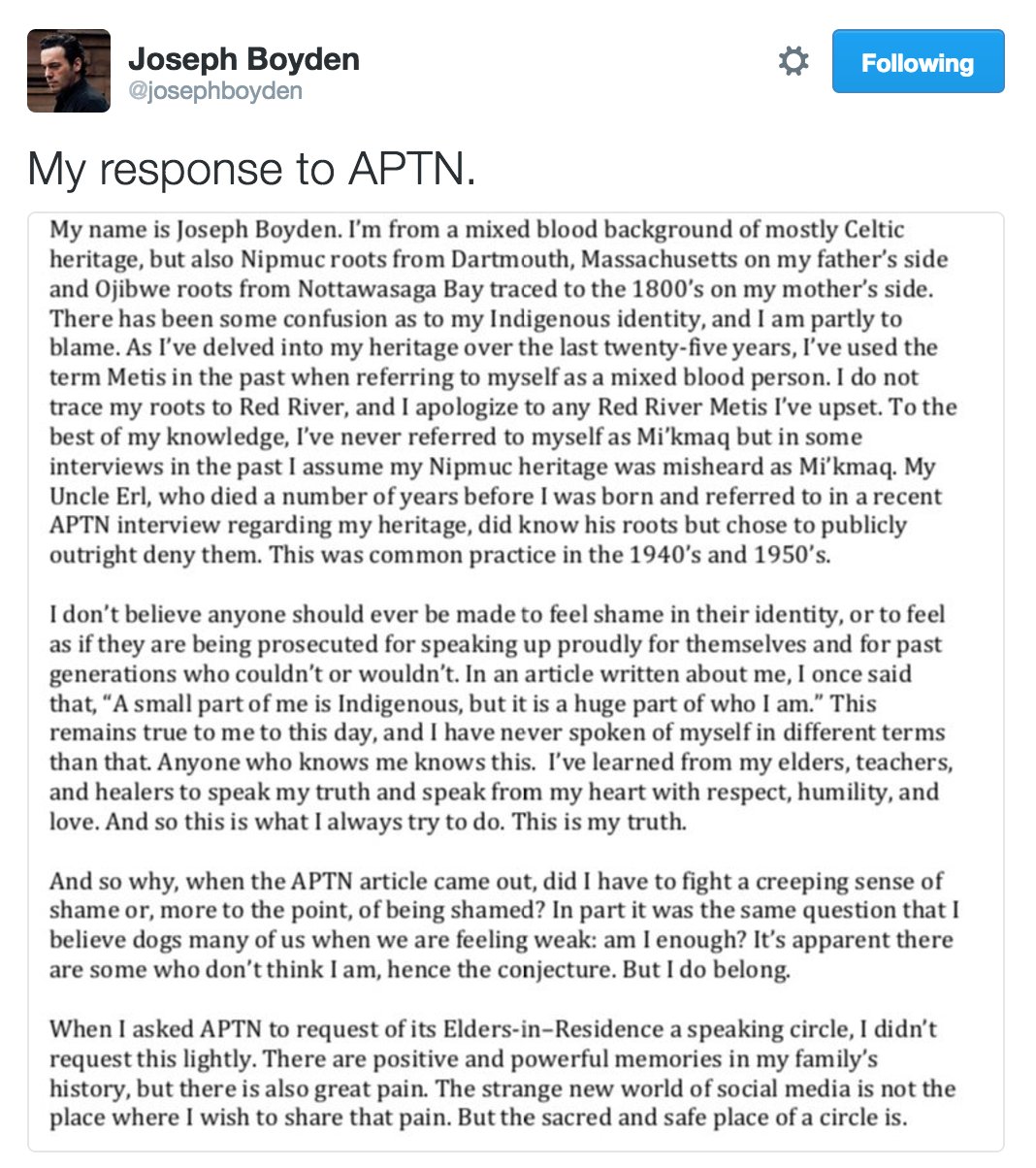
Still adding to my thread on Boyden. On Christmas Eve, he posted a response to APTN: https://twitter.com/josephboyden/status/812798846438928384 … pic.twitter.com/EjH0VYTsBN -
...what's a poor bestselling author with a highly variable ancestral genealogy to do?
-
Well one thing is clearer, even Boyden isn't claiming he's Metis anymore. There's consensus on that now.
-
Giller Prize winner Joseph Boyden’s indigenous ancestry questioned /via @globeandmail http://www.theglobeandmail.com/news/national/giller-prize-winner-joseph-boydens-indigenous-ancestry-questioned/article33429989/?utm_medium=Referrer:+Social+Network+/+Media&utm_campaign=Shared+Web+Article+Links …
-
the ethical labour of some of NAIS's top scholars in writing this letter 18mon ago, seems especially apropos lately https://indiancountrymedianetwork.com/news/opinions/open-letter-from-indigenous-women-scholars-regarding-discussions-of-andrea-smith/ …
-
On Christmas Day (afternoon/evening) news outlets began to publish a short article, by Nicole Thompson: http://www.ctvnews.ca/entertainment/author-joseph-boyden-defends-indigenous-heritage-after-investigation-1.3217325 …
-
On Christmas night, The Globe and Mail ran Sean Fine's more in-depth article on Boyden: http://www.theglobeandmail.com/news/national/giller-prize-winner-joseph-boydens-indigenous-ancestry-questioned/article33429989/ …
-
Here's a news story re the Choctaw child with info you need, if you're going to be informed re identity: https://indiancountrymedianetwork.com/news/native-news/icwa-lexi-to-remain-with-utah-family-in-appeals-court-ruling/ …
-
He has an uncle who played Indian but denied being Indian. Indeed, as the @APTN article showed, that man delighted in fooling ppl.
-
I linked to the ATPN article way back in this thread. Here it is again, for your convenience: http://aptn.ca/news/2016/12/23/author-joseph-boydens-shape-shifting-indigenous-identity/ …
-
Here's a new thread from Robert Jago, who--this week--has been tweeting from @IndigenousXca. https://twitter.com/IndigenousXca/status/813236288983801857 … His first thread...
-
...on Boyden, claims to Native identity, and who can tell our stories, was on Dec 22nd from the @IndigenousXca acct: https://twitter.com/IndigenousXca/status/812095345912119300 …
-
Yesterday, writer @aaronpaquette did a thread on Boyden's claims: https://twitter.com/aaronpaquette/status/813099748022484992 …
-
Great collection of threads / current convo--just reading & listening, atm. h/t @debreese @apihtawikosisan @IndigenousXca@justicedanielh https://twitter.com/debreese/status/812673387415932929 …
-
Last night, scholar and writer, @justicedanielh did an excellent thread in response to those who think that asking these questions...
-
... re Boyden and identity, is wrong. Here's @justicedanielh thread: https://twitter.com/justicedanielh/status/813270135674961920 … Also! Follow Daniel, and read his writings.
-
I see, in this video from 2009, that high school students were assigned Boyden's THREE DAY ROAD: https://www.youtube.com/watch?v=4CbgGD16X_E …
-
In an article, I saw that Boyden said Trump is a trickster. That led me to this: https://twitter.com/danrueck/status/796722282727096320 …, which is evidence that...
-
That finally unraveled. Here's an article about her: https://indiancountrymedianetwork.com/news/opinions/open-letter-from-indigenous-women-scholars-regarding-discussions-of-andrea-smith/ …
-
The second was David Anthony Clark, who said he was Meskwaki (Sac and Fox.) Those two cases led us to write this: http://www.ais.illinois.edu/research/identity-and-academic-integrity
-

Woah. Robert Jago pointed to a 2011 article where Boyden is talking about how he is two spirit.... https://twitter.com/IndigenousXca/status/813351440764796928 … pic.twitter.com/rbh0db4EAp -
Just saw @KimTallBear tweet this thread by a white woman, on Boyden: https://twitter.com/sarahshulist/status/813441234698014722 …
-
Re Boyden, this is quite good: https://peggyblair.wordpress.com/2016/12/26/joseph-boydens-disputed-status-as-indigenous-spokesman-and-why-it-matters/ …
-
Here's an example that @jeffdberglund shared earlier today. It is interview from 2005 where reporter said Mi'kmaq. https://twitter.com/jeffdberglund/status/813486325848424448 …
-
This is the most painful thread on Boyden and his claims to Native identity, the ways he's been navigating... https://twitter.com/apihtawikosisan/status/813503205057449984 …
-
The most recent major news media article on Boyden is by Tristin Hopper at The Province: http://www.theprovince.com/news/national/98do+think+crazy+horse+checked+warrior+status+cards+fight+over/12594059/story.html?utm_source=dlvr.it&utm_medium=twitter …
-
... that suggestion shows ignorance on part of person making it. DNA testing will not help. Earlier today, @KimTallBear did a long...
-
... wouldn't help re Elizabeth Warren. Same holds true for Boyden: https://twitter.com/KimTallBear/status/813475847466319872 …
-
TALES OF THE MIGHTY CODE TALKERS: … https://americanindiansinchildrensliterature.blogspot.com/2016/12/highly-recommended-tales-of-mighty-code.html …
-
...reading/thinking abt what I read as people weigh in or add to what they've previously said. Here's @innes_rob https://twitter.com/innes_rob/status/813532328538406912 …
-
Here's @BigMMusings's thread: https://twitter.com/BigMMusings/status/813468583942651904 …
-
Earlier in this long thread on Boyden, I pointed to @adamgaudry. Yesterday he took a look at Boyden's uncle, who Boyden references...
-
... a lot, as a means to prove his identity. @adamgaudry's TL on that uncle is excellent: https://twitter.com/adamgaudry/status/813591251547103232 …
-
In response to Boyden's fans, @justicedanielh did a thread last night that I rec you read: https://twitter.com/justicedanielh/status/813581012827598848 …
-
See, especially, @Hayden_King's critique: http://muskratmagazine.com/critical-review-of-joseph-boydens-the-orenda-a-timeless-classic-colonial-alibi/ …
-
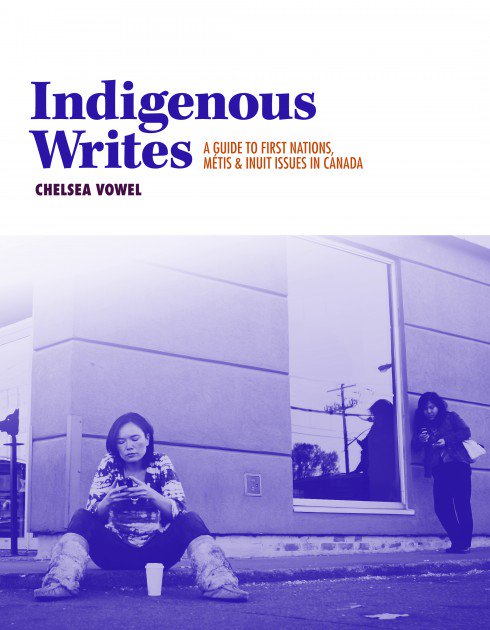
Earlier in this thread, I've pointed you to Chelsea Vowel's TL. I've learned a lot from. Get her book. http://www.portageandmainpress.com/product/indigenous-writes/ …pic.twitter.com/UA4VjcPRB9 -
12/28/16, morning: More to add to thread I started 5 days ago on Joseph Boyden. Here's Audra Simpson's comments: https://twitter.com/RedIndianGirl/status/813859775092035585 …
-
... of the APTN article on Boyden, the Litopedia team decided to share it. Here's the link: https://litopia.com/joseph-boyden-who-are-you-really/ …
-
-
Here's a short thread @Litopia did when Boyden walked out of the interview: https://twitter.com/litopia/status/403532481489424384 …
-
See @KimTallBear's thread as she listened to Boyden's interview: https://twitter.com/KimTallBear/status/813979845587849216 …
-
I've also seen a lot of tweets from Ernie Cray. Last night, he was interviewed abt Boyden: http://www.ctvnews.ca/video?clipId=1024376&playlistId=1.3218874&binId=1.810401&playlistPageNum=1&binPageNum=1 … He's defending Boyden.
-
Another thread to read/study (on Boyden) is this one, from @Kamayaam: https://twitter.com/Kamayaam/status/813764215534063618 …
-
Earlier today, The Globe and Mail published @Hayden_King's opinion piece on Boyden: http://www.theglobeandmail.com/opinion/joseph-boyden-where-are-you-from/article33441604/?utm_source=twitter.com&utm_medium=Referrer:+Social+Network+/+Media&utm_campaign=Shared+Web+Article+Links …
-
He wrote an open letter re investigation/firing of writer, Steven Galloway. @ZoeSTodd was interviewed abt it here: http://www.quillandquire.com/omni/qa-zoe-todd-on-rape-culture-canlit-and-you/ …
-
Just saw that The Walrus has an article up now, about Boyden: https://thewalrus.ca/why-is-joseph-boydens-indigenous-identity-being-questioned/ …
-
The editor at The Walrus really needs to do some reading. He could start with Kim @KimTallBear's thread: https://twitter.com/KimTallBear/status/814165113225834496 …
-
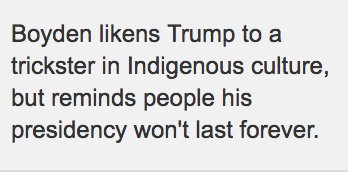
In November, Boyden compared Trump to a trickster. He says some pretty messed up/ignorant things. pic.twitter.com/jzkaAJA5nf -
Here's the trump/trickster article if you want to see it: http://www.cbc.ca/news/canada/edmonton/boyden-indigenous-innovation-summit-1.3844277 …
-
Earlier today I pointed to an interview Ernie Crey did re Boyden. Here's a response to his points, from @ZoeSTodd: https://twitter.com/ZoeSTodd/status/814185179698888704 …
-
And, looks like there will be a radio segment (or is it TV?) on Boyden tonight: https://twitter.com/LorenMcGinnis/status/814195607610888192 …
-
No surprise to see "lynching' and "mob" used to describe Native ppl who speak up in defense of our nations. http://www.theglobeandmail.com//opinion/joseph-boydens-lynching-should-set-off-alarm-bells/article33444228/?cmpid=rss1&click=sf_globe …
-
I wonder if Boyden read Yakabuski's opinion piece in Globe and Mail? http://www.theglobeandmail.com//opinion/joseph-boydens-lynching-should-set-off-alarm-bells/article33444228/?cmpid=rss1&click=sf_globe … If he did, is he nodding? Or cringing?
-
I hope the Boyden fans read Dave Obee's "Boyden Should Clear Up Ancestry Claim." http://www.timescolonist.com/opinion/columnists/dave-obee-boyden-should-clear-up-ancestry-claim-1.5600362 …
-
Is any native man actually employed as a writer at the Globe, Star, Sun, or Post? https://twitter.com/genrysg/status/814464200714153986 …
-
Three of the six controversies in young adult lit have problematic content abt Native ppl: https://www.bustle.com/articles/198750-the-worst-book-controversies-of-2016-and-what-to-read-in-response … @zlikeinzorro
-
Here's the Bustle article on controversies in young adult lit. https://www.bustle.com/articles/198750-the-worst-book-controversies-of-2016-and-what-to-read-in-response … Three of the 6 are abt Native content.
-
Long thread by @debreese on Native identity. https://twitter.com/debreese/status/812673387415932929 … Upshot: relevant Q not "what's your DNA?" but "what nation claims you?"
-

The more I items I read abt Boyden, the more I cringe. See @duane_linklater's account here: http://www.duanelinklater.com/ This is 1st paragraph: pic.twitter.com/HZKN8fDIcM -
Who is asked to write abt Boyden, and why, is an imp aspect of this mess. @justicedanielh lays it out here: https://twitter.com/justicedanielh/status/814532448595738624 …
-
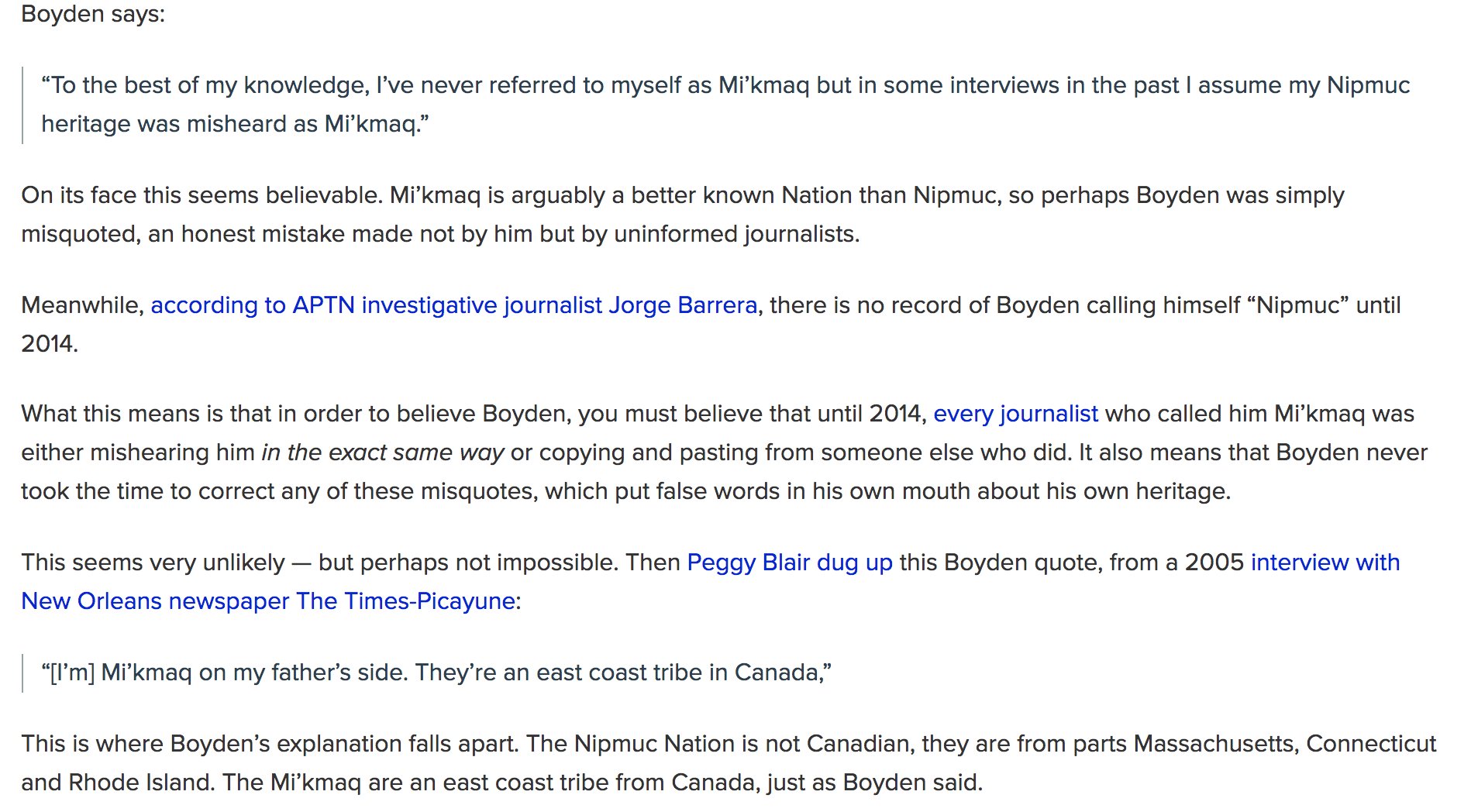
A concise analysis of claims Joseph Boyden has made re his identity: http://www.canadalandshow.com/things-joseph-boyden-claimed-not/ … pic.twitter.com/nBpDYCDmGX -
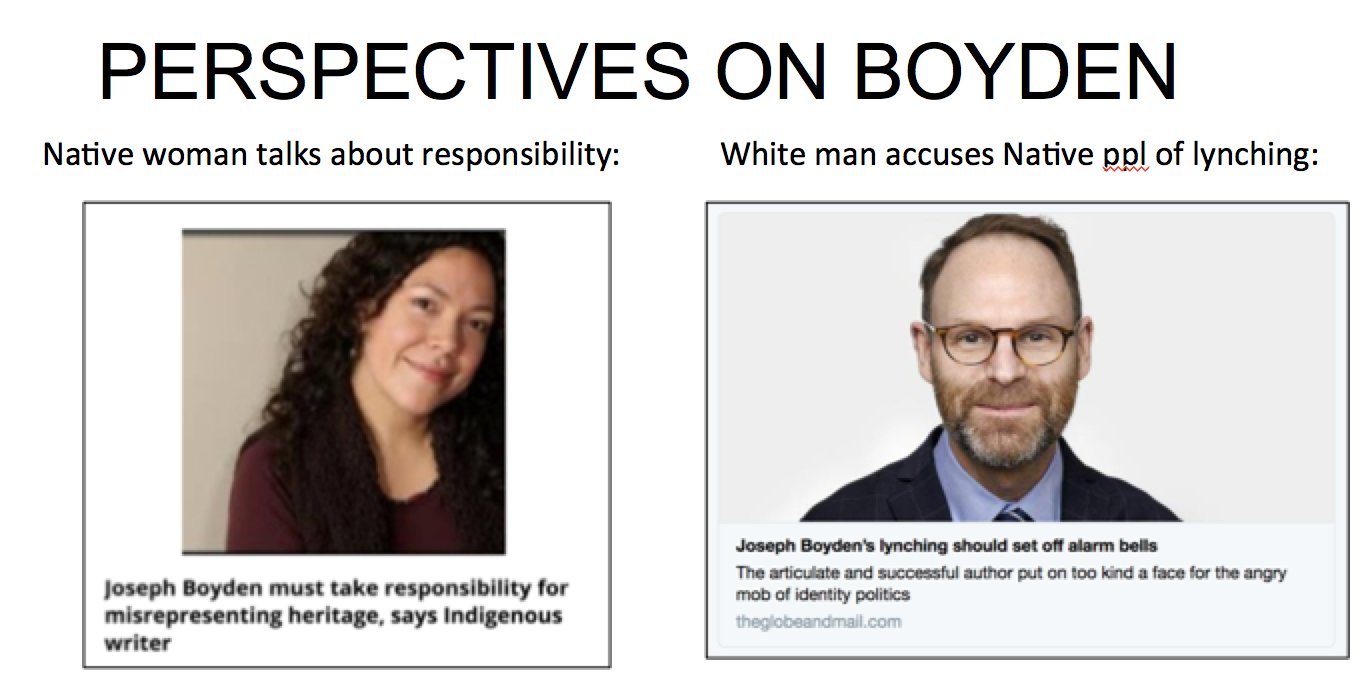
Read Tabodondung's POV here: http://www.cbc.ca/1.3907253 and Yakabuski's here: http://www.theglobeandmail.com/opinion/joseph-boydens-lynching-should-set-off-alarm-bells/article33444228/ … Also, @globeandmail changed... pic.twitter.com/VNsEmoaiDO -

... its headline. In original, they used "lynching" but have since taken it out. It still shows, tho, in the URL. pic.twitter.com/UVBoLXxORX -
Early today @tuckeve wrote to Globe and Mail about their use of "lynching" -- here's her tweet abt it: https://twitter.com/tuckeve/status/814484764254212097 …
-
Another article on Boyden. I had to hit translate to read it. http://ici.radio-canada.ca/nouvelle/1008363/ecrivain-joseph-boyden-metisse-usurpateur-aptn-autochtone-metis … Cites @apihtawikosisan and @IndigenousXca
-
@apihtawikosisan and @adamgaudry. See his newest thread: https://twitter.com/adamgaudry/status/814589995340234752 …
-
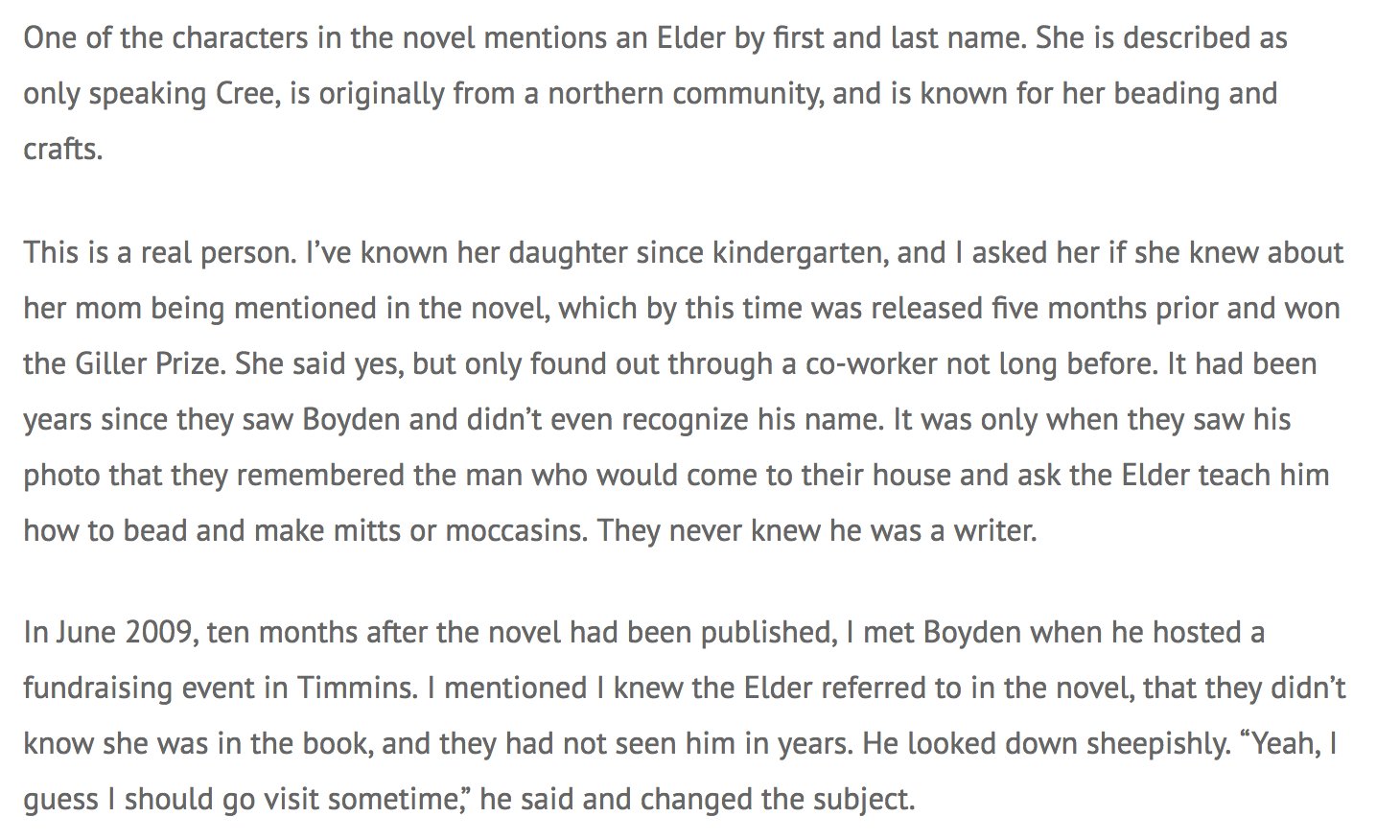
This account re Boyden's research for THROUGH BLACK SPRUCE is hard to read: https://lennyshish.wordpress.com/2016/12/30/boyden-i-discovered-a-gold-mine-on-james-bay/ …pic.twitter.com/amu594hpQZ -
Do make sure you read Lenny Carpenter's post on Boyden. https://lennyshish.wordpress.com/2016/12/30/boyden-i-discovered-a-gold-mine-on-james-bay/ … Boyden saying he discovered a gold mine... WTF.
-
Ah! Check out this article abt f'ed up headline in Globe and Mail abt Boyden being "lynched." https://www.pressprogress.ca/the_globe_and_mail_has_officially_published_canada_worst_headline_of_2016 … h/t @KimTallBear
-
See this thread, from @FancyBebamikawe. Read with care, and think, about what she's saying: https://twitter.com/FancyBebamikawe/status/814621803842859008 … and then revisit...
-
Here's his article: ttp://www.cbc.ca/1.3915934 Did you note @JordWheel's ref to his mom? I love her bks! … https://americanindiansinchildrensliterature.blogspot.com/2011/10/lesson-plan-where-did-you-get-your.html …
-
I've seen tweets that q's re Boyden's claims may hurt those who were taken from family. This thread addresses that: https://twitter.com/CotySavard/status/814639276759531520 …
-
Vice News Canada has an article up now, on Boyden: https://news.vice.com/story/controversy-over-canadian-author-joseph-boydens-indigenous-roots-isnt-about-blood … Cites @KimTallBear @aaronpaquette@rjjago
-
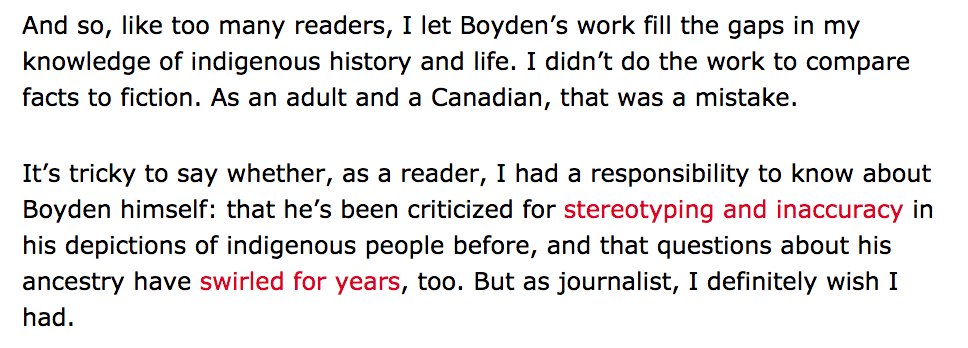
Another article from Globe and Mail, about Boyden: http://www.theglobeandmail.com/arts/books-and-media/why-the-facts-behind-joseph-boydens-fiction-matter/article33454930/?cmpid=rss1 … pic.twitter.com/vBZm4W5mf9 -
In this article, https://news.vice.com/story/controversy-over-canadian-author-joseph-boydens-indigenous-roots-isnt-about-blood …, Frank Busch defends Boyden. Here is a response to Busch: https://twitter.com/RedIndianGirl/status/814878105764499456 …
-
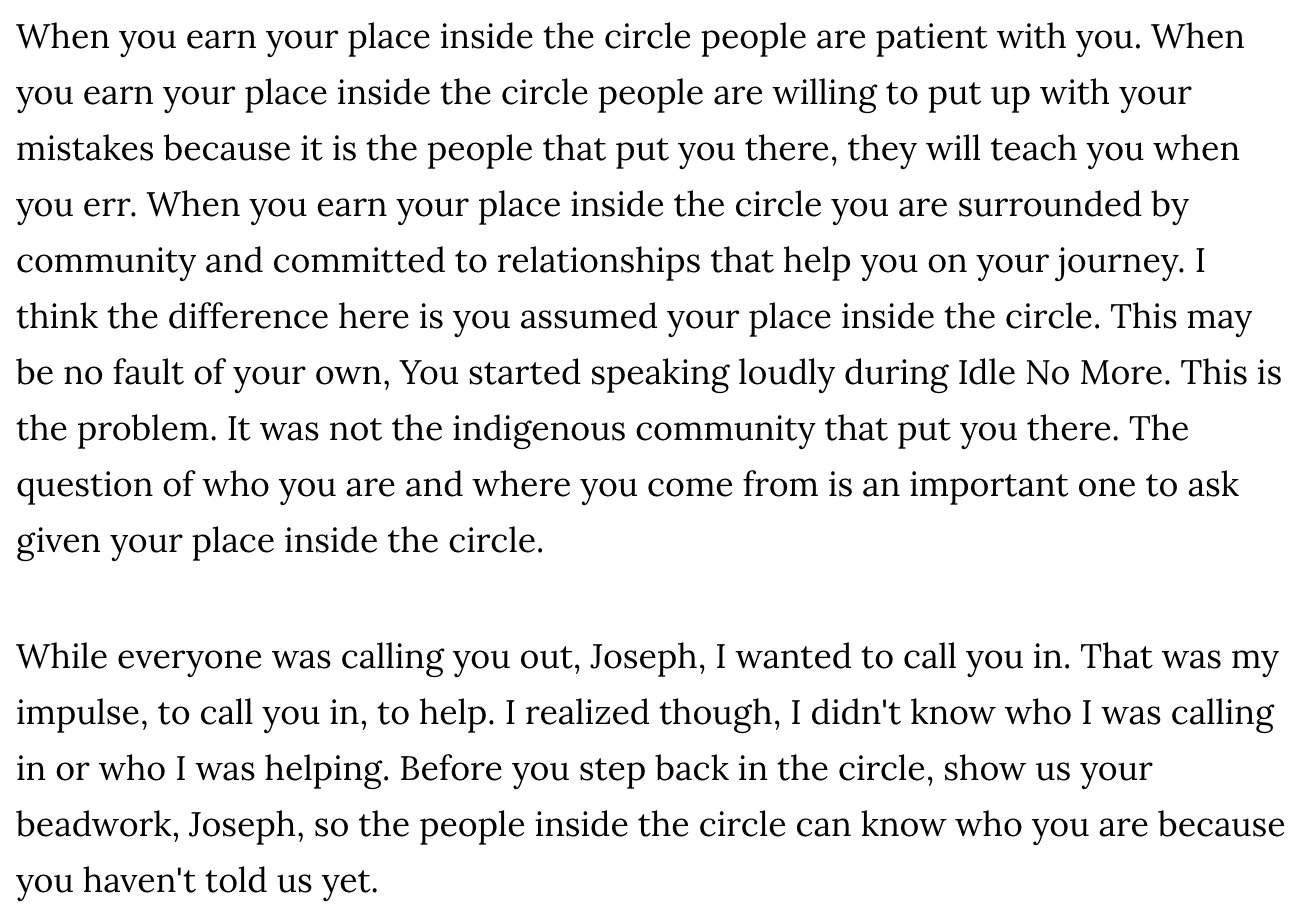
"What Colour is Your Beadwork, Joseph Boyden" asks @RMComedy: https://www.vice.com/en_ca/article/what-colour-is-your-beadwork-joseph-boyden … Ryan McMahon's piece is one of the must-reads. pic.twitter.com/4soBGPsOMV -

Letter by @teikanewton "Here's how Joseph Boyden reinforced system oppression of First Nations." http://www.nationalobserver.com/2016/12/30/opinion/heres-how-joseph-boyden-reinforced-systemic-oppression-first-nations …pic.twitter.com/72I4MORGsJ -
Adding another thread by Dr. Chris Anderson (@BigMMusings) that breaks down the q's re blood/blood quantum & Boyden https://twitter.com/BigMMusings/status/814903632483287041 …
-
PODCAST—Why 2016 a breakout year for empowering Indigenous media arts + activism; #JosephBoyden's identity questions http://mediaindigena.libsyn.com/ep-43-indigenous-look-back-at-2016-joseph-boydens-identity-questions …
-
In addition to @CBCIndigenous articles on Boyden, take time to listen to radio interview with Rebeka Tabobondung: http://www.cbc.ca/listen/shows/as-it-happens/segment/11266887 …
-
Yesterday, @aaronpaquette did a thread on the who-can-speak question, too: https://twitter.com/aaronpaquette/status/815015649055571968 …
-
Tabobondung talked abt problems in interpretation of a community not ones own. Terri Monture's rev of Boyden's ORENDA...@RedIndianGirl
-
gets at what Tabobondung was talking about: http://redindiangirl.blogspot.com/2013/09/in-which-i-review-joseph-boydens-orenda.html … @RedIndianGirl
-
What Colour Is Your Beadwork, Joseph Boyden? https://www.vice.com/en_ca/article/what-colour-is-your-beadwork-joseph-boyden … via @vicecanada
-
Joseph Boyden: From Frying Pan to Fire | MELANIE LEFEBVRE #josephboyden #ubcaccountable #canlit https://melanielefebvre.com/2016/12/30/joseph-boyden-from-frying-pan-to-fire/ …
-
4:07, Jan 2, 2017: RT'ing items from Jan 1 and Jan 2, on Joseph Boyden, to add to the Storify I started on Dec 24th. Here's @RachelAnnSnow: https://twitter.com/RachelAnnSnow/status/815562677887995905 …
-
My thoughts on the @josephboyden uproar for whatever it’s worth: https://dragswolf.org/journal/on-joseph-boyden …
-
How #JosephBoyden ’s claims to Indigeneity affect us all via Ricochet https://ricochet.media/en/1609/how-joseph-boydens-claims-to-indigeneity-affect-us-all …
Part Two: (in process)
January 2, 2017
January 3, 2017
January 4, 2017
January 5, 2017
January 6, 2017
January 8, 2017
January 2, 2017
- Albert W. McLoad's letter in response to Boyden's definition of Two-Spirit
January 3, 2017
- Sadie-Phoenix Lavoie and Jacqueline Pellend, Joseph Boyden's Identity Crisis: Women's voices on determining identity at Deprogrammed
- Danielle Paradis, Joseph Boyden's indigenous controversy part of 'broader structural problem' at Toronto Metro
- Wab Kinew's There is room in our circle for Joseph Boyden at The Globe and Mail
January 4, 2017
- Wab Kinew, 'I think he should be completely upfront about his ancestry' at APTN
- Terry Glavin, The unbearable whiteness of Joseph Boyden's Aboriginal identity controversy at National Post
- Thohahoken, Boyden an example of how the winners get to write the history at Two Row Times
- Rachel A. Snow, Staying Silent at Two Row Times
January 5, 2017
- Terese Marie Mailhot's Tell Joseph Boyden You Can't Sell 'Indian' Like A Souvenir at Huffpost Canada
- Ryan McMahon, on Joseph Boyden: Two Worlds, Two Debates, at CanadaLand (also has links to items)
- Wab Kinew, Lee Maracle, and Kim TallBear on Indigenous identity and the case of Joseph Boyden on The Current, at CBC Radio
- Clayton Thomas-Muller and Mona Moquin, Indigenous identity panel at CBC InfoRadio
- Editorial, Profiting from identity politics, Winnipeg Free Press
January 6, 2017
- Aaron Paquette's The Struggle for Joseph Boyden
- Marsha Lederman's Amid heritage controversy, heavyweights stand by Joseph Boyden in The Globe and Mail
- Editorial, The Spectator's View: In defence of Joseph Boyden at Hamilton Spectator
- Doug George-Kanentiio's Author Joseph Boyden exploits mythical Native identity at Indianz
- Daniel Heath Justice's thread on Twitter, starting at 12:58 PM
- Dawn Marie's storify, Things to consider on self-identification
January 8, 2017
- Stephen Kimber's Who is Joseph Boyden, and does the answer matter? in Halifax Examiner
- Zoe Todd's Métis legal traditions, reciprocity and the curious case of consumable identity
- Ryan McMahon, on The National panel, "Taking on an identity: The Joseph Boyden debate"
- Karen McCall's How the Headlines Covered the Controversy Over Joseph Boyden's Heritage at Ryerson Review of Journalism
- Terese Mailhot's Natives Joseph Boyden, Natives Don't Get Pity at Indian Country Today
January 10, 2017
- Robert Jago's The Boyden Controversy Is Not about Bloodline at The Walrus
January 11, 2017
- Russell Diabo's Why Joseph Boyden's ancestry matters at CBC News Ontario Today
- Jessica Wong's Joseph Boyden sorry 'for taking too much of the airtime' on Indigenous issues at CBC News Entertainment
- Cheryl Toney Holley's Award Winning Canadian Author Claims that Dartmouth Indians are Really Nipmuck?
- Candy Palmater's Full interview: Joseph Boyden on his heritage at CBC radio's 'q with Tom Power'
- Joseph Boyden's Statement by Joseph Boyden at CNW (Canada News Wire)
- Mark Medley's report of interview, Boyden admits to mistakes, backs down as indigenous spokesperson at The Globe and Mail
... back to the bulleted list, which--from here--is primarily responses to Boyden's remarks. When this started back in December, the headline on the APTN article had "shape shifting identity" in it. As some of these responses indicate, he's shifting his stories now. Previously, he said his family never talked about their Native ancestry, now--he says--they talked about it all his life, from his birth, even, telling stories.
- Adam Gaudry's thread on Twitter, listening to/analyzing Boyden's interview
- Robert Jago's thread on Twitter, listening to/analyzing Boyden's interview
- Fancy Bebamikawe's thread on Twitter, on Boyden's interview
- Aaron Paquette's thread on Twitter, in response to Boyden's interview
- Damien Lee's thread on Twitter, about adoption/Boyden's words about being adopted
January 12, 2017
- APTN's Author Joseph Boyden launches PR push to counter controversy
- Tim Fontaine's Joseph Boyden's first interview 'a start' but leaves unanswered questions at CBC News/Indigenous
- Nigel Irwin's Joseph Boyden's Apology and the Strange History of 'Pretendians' at Vice
- Marilyn Jensen's radio interview, Yukon First Nation instructor speaks on Joseph Boyden and identity, at CBC Yukon
1) Boyden's publisher (Penguin Random House in Canada), and his editor (Nicole Winstanley) voiced support for Boyden. Major publishers like Penguin are huge corporations. Integrity of writing or author does not matter. If it did, Simon and Schuster would not be publishing the White supremacist, Milo Yiannopoulos. It will make a lot of money for its publisher. Boyden's books make a lot of money for Penguin.
2) The Tozer's, who Boyden referenced in his 1/12/17 interview with Candy Palmater, also issued a statement of support. William and Pamela Tozer are Moose Cree, and run Camp Onakawana, near Moosonee, Ontario. In 2014 (article linked below), Boyden wrote about the camp and said that William Tozer is the inspiration for Uncle Will Bird, a character in Boyden's Through Blue Spruce.
- Penguin Books Canada, on Twitter, We are proud to publish Joseph Boyden
- Nicole Winstanley, Boyden's editor, on Twitter, I've known Joseph Boyden to be a person of integrity
- Pamela Tozer's post on Facebook, We are the Tozer family.
... resuming the list:
- Victoria Ahearn's Joseph Boyden statements on indigenous roots too vague, say academics at The Province
- Jorge Barrera's interview of Ryan McMahon on Nation to Nation: Boyden, Fonda and Labrador Land Defenders (video broadcast on Jan 12).
- Ian Austen's A Voice for Indigenous Canadians Defends His Claim to Be One at The New York Times
- News Brief, Reaction to Joseph Boyden's New Interviews at CanadaLand
- Chelsea Vowel's response, on Twitter, to the article in The New York Times are important corrections to some of the content in the article
- Hayden King's response, on Twitter, to the New York Times article on Boyden corrects errors therein
- David Newhouse's How to evaluate Joseph Boyden's claim to ancestry in The Toronto Star
- Rick Salutin's The Boyden affair just got murkier in The Toronto Star
- CBC News item First Nations filmmaker in Manitoba adopting Joseph Boyden as her brother at CBC News/Indigenous
- Peggy Blair's The Inconsistencies in Joseph Boyden's Various Backgrounds
- Alicia Elliot's Twitter thread on Boyden, CanLit accountability, and PR (Note: she was the host for the IndigenousXca account when she wrote that thread for that account)
January 14, 2017
- The Canadian Encyclopedia has added information about Boyden's identity and his role in the Galloway letter to its entry on Joseph Boyden [note: I'm inserting it here, but the "last edit" date for it is Jan 7]
- Doug Cuthand's There is room in the tent for Joseph Boyden at Saskatoon StarPhoenix
... Daniel Heath Justice shared an article from 2013 in which Boyden makes a claim to being Wendat. So far as I recall, that claim had not been written about. Here's a photo from the article, with the final paragraph pasted beneath the photo:
- Tanya Talaga's Joseph Boyden's identity crisis opens us questions on who is part of a community at The Star
January 15 2017
- BC Metis Federation's Coffee Talk on Jan 15 (at 10 minute mark the hosts discuss Boyden)
January 16, 2017
- Shree Paradkar's Oh, Please. Joseph Boyden not the victim in indigenous ancestry saga at The Star
- Nickita Longman and Wab Kinew at Who Speaks for Indigenous Causes at Native America Calling
- Shaneen Robinson's report at APTN, "He has agreed to be my brother"/Why Lisa Meeches is adopting Joseph Boyden
- National News at APTN, University professor cutting Joseph Boyden novels
- Jeremy Simes, Edmonton cancels Joseph Boyden appearance in February at Edmonton Metro
- Sue Carter's Joseph Boyden's post-TRC conference keynote cancelled, at Quill & Quire
Reviews by People of the
Native Communities Boyden's Books Depict
Three Day Road, published in 2005 by Viking Penguin
Through Blue Spruce, published in 2009 by Viking Penguin
- Lenny Carpenter's Boyden: 'I discovered a gold mine on James Bay'
The Orenda, published in 2013 by Penguin Random House



